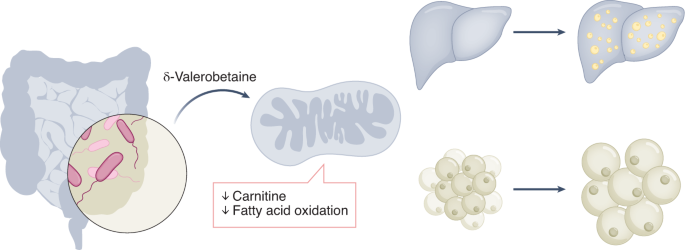Whether and how host energy metabolism can be controlled by commensal microorganisms remains controversial. New work shows that the microbe-derived metabolite δ-valerobetaine contributes to obesity and hepatic steatosis by modulating mitochondrial fatty acid oxidation and increasing lipid storage in the adipose tissue and liver.
To first identify microbiome-dependent metabolites, the authors took a group of three-week-old germ-free mice, and introduced microbiota through exposure to bedding from conventionally housed mice. After three weeks, they compared the metabolomic profiles of these mice to the germ-free controls. In samples of liver and liver mitochondria, they identified a highly altered metabolite, and through a series of careful experiments, pinpointed this metabolite as δ-valerobetaine. In the conventional mice, this metabolite was present in multiple tissues, plasma and cecal contents. However, it was undetectable in samples from germ-free mice, which lack microbiota. Similarly, ex vivo incubation of cecal contents from conventional, but not germ-free, mice resulted in production of δ-valerobetaine, supporting a role for microbiota in the generation of δ-valerobetaine (consistent with previous reports3).
https://www.nature.com/articles/s42255-021-00495-4
